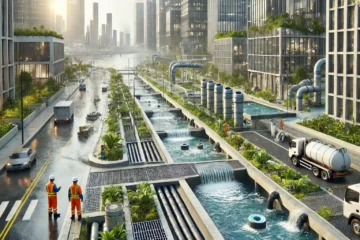Wastewater Treatment: A Vital Process for Environmental Sustainability
What is Wastewater Treatment?
Wastewater treatment is a process that involves removing contaminants from wastewater generated by domestic, industrial, and commercial activities. This wastewater, if untreated, can pollute water bodies, leading to serious environmental and health issues.
Why is Wastewater Treatment Important?
- Protecting Public Health: Untreated wastewater can carry harmful bacteria and viruses, posing a significant risk to public health.
- Preserving Water Bodies: By removing pollutants, wastewater treatment helps maintain the ecological balance of rivers, lakes, and oceans.
- Sustainable Water Management: Treated wastewater can be reused for various purposes, such as irrigation and industrial processes, conserving valuable water resources.
Stages of Wastewater Treatment
The wastewater treatment process typically involves three main stages:
- Primary Treatment:
- Physical Removal: Large solid objects, such as debris and grit, are removed through screens and settling tanks.
- Primary Clarification: Smaller suspended solids settle to the bottom of the tank, forming sludge.
- Secondary Treatment:
- Biological Treatment: Microorganisms break down organic matter in the wastewater, reducing its organic content. This can be achieved through:
- Activated Sludge Process: Aeration tanks promote the growth of bacteria that consume organic matter.
- Trickling Filter: Wastewater is sprayed onto a bed of media, where bacteria break down organic matter.
- Biological Treatment: Microorganisms break down organic matter in the wastewater, reducing its organic content. This can be achieved through:
- Tertiary Treatment:
- Disinfection: To kill remaining bacteria and viruses, chlorine, ultraviolet light, or other disinfectants are used.
- Nutrient Removal: If necessary, additional processes are employed to remove nutrients like nitrogen and phosphorus, which can contribute to water pollution.
Emerging Technologies in Wastewater Treatment
- Membrane Bioreactors (MBR): Combine biological treatment with membrane filtration for high-quality effluent.
- Advanced Oxidation Processes (AOPs): Use powerful oxidants to degrade organic pollutants.
- Constructed Wetlands: Utilize natural processes to treat wastewater, often in a cost-effective and environmentally friendly manner.
Challenges and Future Trends
While wastewater treatment is essential, challenges remain:
- Energy Consumption: Treatment processes can be energy-intensive.
- Sludge Treatment: Proper disposal or beneficial use of sludge is crucial.
- Emerging Contaminants: Addressing new pollutants like pharmaceuticals and microplastics requires innovative solutions.
Future trends in wastewater treatment include:
- Integration of Renewable Energy: Using solar or wind power to reduce energy consumption.
- Resource Recovery: Recovering valuable materials like phosphorus and energy from wastewater.
- Digitalization and Automation: Implementing advanced technologies for efficient monitoring and control.
By addressing these challenges and embracing emerging technologies, we can ensure the sustainable management of wastewater and protect our environment for future generations.


